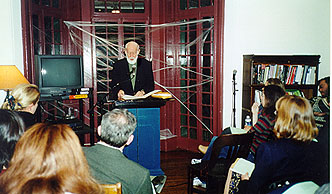Geoffrey Hartman at the Kelly Writers House
Holocaust survivor testimonies
Listen to a recording of this program.

The Pilot Curriculum Project of the College of Arts & Sciences, the Kelly Writers House, the Center for Advanced Judaic Studies, and the Annenberg School for Communication together sponsored a seminar on holocaust survivor testimonies led by Geoffrey Hartman, Sterling Professor Emeritus of English and Comparative Literature, Yale University, at 7 PM, October 30, 2001, at the Kelly Writers House.
Geoffrey Hartman is the author of more than twenty books and hundreds of essays, and is one of America's most renowned literary scholars. Professor Hartman also founded the Fortnoff Video Archives of Holocaust Testimonies and has written extensively on literary and moral questions related to the Holocaust. He has also played a critical role in opening Judaic studies to a wider audience of scholars and students.
Geoffrey Hartman's visit to Penn is jointly sponsored by the Center for Advanced Judaic Studies, the "pilot curriculum" project of the College of Arts & Sciences, the Kelly Writers House, and the Annenberg School for Communication (with special thanks to Barbie Zelizer of the Annenberg faculty), the Penn Humanities Forum, the departments of English and History, and Penn's Jewish Studies Program.
- Introduction by Al Filreis (5:03)
- Introduction and discussion by Geoffrey Hartman (30:51)
- On choosing the interviewees (3:12): the Q & A session began with the question: "Did you take the testimony of anybody other than the victims - for example, the Kapos"?
- On choosng the interviewers (4:54): "How were the interviewers selected? Were there certain questions you told them not to ask?"
- On means vs. ends (1:05): An audience member pointed out that in one of the testimonies, the interviewer inadvertently did the interpretation of one of interviewees' responses. Although technically inappropriate, the interference prompted the interviewee to expand upon his answer. Does the result justify the intervention?
- On people's willingness to be interviewed (0:59): This discussion began with the question "From your experience, what is the difference between people who give testimony and those who don't?"
- On strategies of survival (2:01): When an audience member pointed out the differences in her parents' way of coping with their memories of the Holocaust, a conversation began on the variations in the survivors' coping techniques, and the way these are reflected in their testimonies.
- On camera action (1:54): An audience member noted that in one of the videos, the sound of dentures clicking was audible. This raised a host of moral and artistic issues. "Was camerawork a violation of informed consent? The interviewee can choose what they will wear that day, and how they will do their hair, but they cannot choose the camera angle or sound. Is the camera person imposing their own interpretation?"
- On language of the testimonies (4:00): This discussion began with the question "Which language were the interviews conducted in?" and continued on the topics of interviewees' choice of language and the language of the original testimonies back in 1945.

